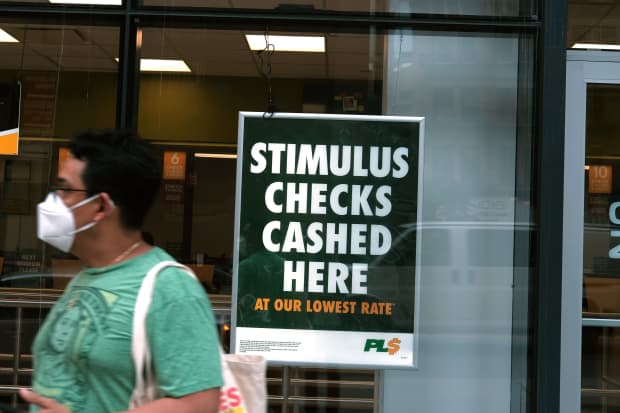This post was originally published on this site

NEW YORK, NEW YORK – JULY 21: A company advertises their services on July 21, 2020 in the Brooklyn borough of New York City. As the United States economy continues to struggle due to the coronavirus pandemic, a surge in corporate bankruptcies is only adding to a difficult labor market. Through June 30 of this year, there have been over 3,600 Chapter 11 filings, including by such well-known companies as J. Crew, Neiman Marcus, Hertz and others. (Photo by Spencer Platt/Getty Images)
Spencer Platt/Getty Images
Wall Street has given up on another big Washington financial-aid package for the economy before the Nov. 3 presidential election — but it still thinks another huge rescue package is coming.
President Trump briefly raised fading hopes for a few trillion dollars in new aid with a series of tweets and statements last week urging Congress to approve more money for the unemployed and companies most hurt by the coronavirus pandemic.
Yet House Speaker Nancy Pelosi, a Democrat, and Senate Majority Leader Mitch McConnell, a Republican, have both said no despite broad support in both parties for extra relief.
Pelosi appears to be betting on Democrats winning the presidency and is unlikely to budge unless the Trump White House agrees to most of her party’s demands. McConnell has said the two parties remain too far apart to strike a deal with the election so close. Republicans in the Senate prefer a smaller bill that’s more narrowly tailored.
That’s doesn’t mean a gusher of new coronavirus-relief aid is out of the question. Far from it.
Democrats are all but certain to pass a few trillion dollars in pandemic relief — if not more — if they keep the House and seize the Senate and White House. They’ve already done with the so-called $2.2 trillion “Heroes” act that was ignored by the Senate.
“More stimulus is coming in early 2021, and the odds are that it will be bigger than would otherwise be the case,” said Aneta Markowska, chief economist at Jefferies LLC.
Read: Here are the Senate races to watch, as Democrats battle to take control from Republicans
Even if Trump were to defy the polls again and win or the Senate stayed in Republican hands, Washington is likely to spend more money. Just not as much as Democrats want.
What worries economists who think the U.S. needs more stimulus soon is how long it will take for the money to get households and businesses that need it most.
Democrats, for example, could try to wrap a large stimulus into a broader bill that includes other priorities on climate change or higher taxes on the wealthy. The bigger the bill, though, the longer it will take to pass.
” As we saw with the Republicans in 2017 and even the Bush tax cuts in 2000, that could take months to implement, so any potential boost may not come until well after the election,” wrote Michael Pearce of Capital Economics.
The danger is the help will come too late.
Federal Reserve Chairman Jerome Powell and most of his colleagues at the central bank have argued publicly in the past few weeks the economy needs another large stimulus to keep the recovery on track. Rarely if ever have central bankers been so vocal in urging Congress take a specific step.
Read: The U.S. economy is still rising from the rubble, but anxiety is growing about another setback
Without more money, they say, growth could slow, layoffs could rise and the economy would take even longer to return to normal. The result would be long-lasting damage to the well-being of the workers and families most harmed by the pandemic, particularly lower-income Americans who work in industries such as travel and hospitality.
“The economic impact of these downturns is disproportionately borne by those who can least afford it,” said Boston Federal Reserve President Eric Rosengren.
The urgency Congress feels to pass a quick relief bill will largely depend on whether the economy does, in fact, slow sharply in the final three months of 2020. The U.S. grew at a solid pace in August and September even after the last federal aid package expired, confounding widespread predictions of a broader slowdown.
A smaller group of Wall Street DJIA, +0.87% economists contend the U.S. is strong enough to get by without another relief package, but they acknowledge the extra aid could help.

